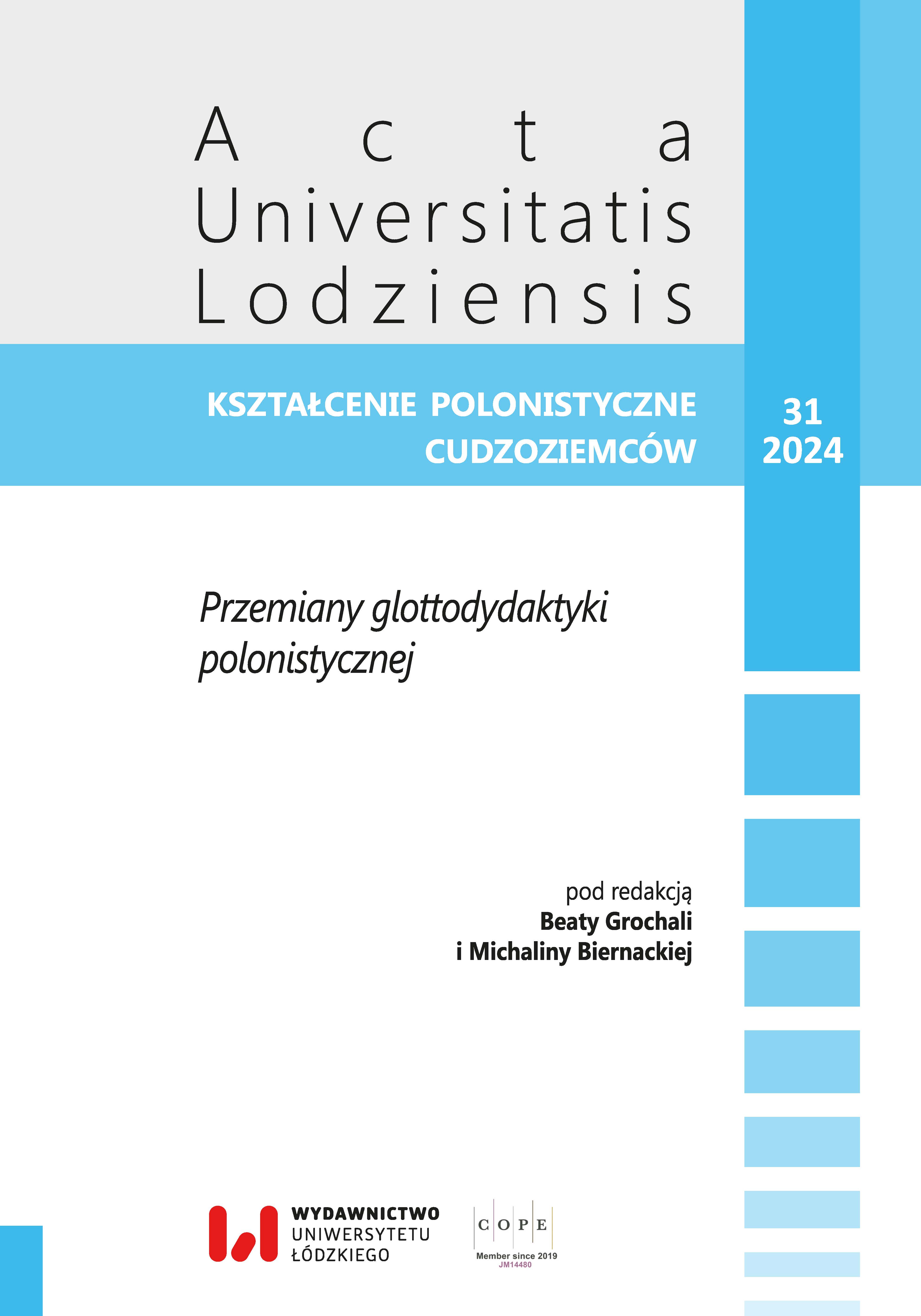Cultural content in teaching polish as a foreign language at B2–C2 levels
DOI:
https://doi.org/10.18778/0860-6587.31.06Keywords:
teaching Polish as a foreign language, foreign language teaching techniques, multiculturalism, intercultural competence, intercultural communicationAbstract
The aim of the article is to present the preferences of foreigners learning Polish at the highest levels of proficiency in terms of: (1) interest in Polish culture, (2) thematic areas related to Polish culture, (3) ways of teaching Polish culture in Polish classes and (4) ways of learning about it by the respondents outside Polish language lessons. The results of a survey conducted among 150 foreigners participating in group courses at B2, C1 and C2 levels in selected native academic centers in 2022 are described in the text. The results of the survey testify to the willingness to explore issues related primarily to everyday life, study and work, the state and society, as well as the positive attitude of the respondents to the use of the feeding method in developing (inter)cultural competences and to discussions on cultural topics with other learners during the lesson. Most of the respondents get to know Polish culture by reading books and communicating with native Polish speakers in public places. The use of the results of the study may contribute to the development of the discussion on the differentiation of cultural material in Polish as a foreign language classes depending on the level of language proficiency of the learners.
References
enveniste É., 1980, Struktura języka i struktura społeczeństwa, w: M. Głowiński (red.), Język i społeczeństwo, Warszawa.
Google Scholar
Bolten J., 2006, Interkulturowa kompetencja, Poznań.
Google Scholar
Byram M., Tost Planet M., 2000, Social Identity and the European Dimension: Intercultural Competence Through Foreign Language Learning, Strasbourg.
Google Scholar
Gudykunst W.B., Kim Y.Y., 2002, Komunikowanie się z obcymi: spojrzenie na komunikację międzykulturową, w: J. Steward (red.), Mosty zamiast murów. Podręcznik komunikacji interpersonalnej, Warszawa, s. 496–514.
Google Scholar
Guilherme M.M., 2002, Critical Citizens for an Intercultural World: Foreign Language Education as Cultural Politics, Bristol. https://doi.org/10.21832/9781853596117
Google Scholar
Hadley G., 1997, Lexis and Culture: Bound and Determined?, „Journal of Psycholinguistic Research”, t. 26, nr 4, s. 483–496.
Google Scholar
Harbig A.M., 2010, Kształcenie kompetencji interkulturowej przyszłych menedżerów – rola zajęć z języka obcego, w: M. Mackiewicz (red.), Kompetencja interkulturowa w teorii i praktyce edukacyjnej, Poznań, s. 211–220.
Google Scholar
Janowska I., Lipińska E., Rabiej A., Seretny A., Turek P., 2016, Programy nauczania języka polskiego jako obcego. Poziomy A1–C2, Kraków.
Google Scholar
Kuo M.-M., Lai C.C., 2006, Linguistics across Cultures: The Impact of Culture on Second Language Learning, „Journal of Foreign Language Instruction” t. 1, nr 1, s. 1–9.
Google Scholar
Łukaszewicz B., 2022a, Codzienność jako kategoria lingwakulturowa w glottodydaktyce polonistycznej, w: S. Cygan, M. Marczewska, K. Ostrowska (red.), Glottodydaktyka polonistyczna wczoraj, dziś, jutro. Między doświadczeniem a wyzwaniami współczesności, Kielce, s. 141–152.
Google Scholar
Łukaszewicz B., 2022b, Wspomaganie autonomii uczących się języka polskiego jako obcego w procesie poznawania kultury polskiej, w: E. Awramiuk, K. Szamryk (red.), Z problematyki kształcenia językowego IX, Białystok, s. 65–77.
Google Scholar
Meyer R., 2023, Mapa kulturowa. Jak skutecznie radzić sobie z różnicami kulturowymi w biznesie, Kraków.
Google Scholar
Sapir E., 1978, Kultura, język, osobowość, Warszawa.
Google Scholar
Straub J., 2010, Lerntheoretische Grundlagen, w: A. Weidemann, J. Straub, S. Nothnagel (red.), Wie lehrt man interkulturelle Kompetenz? Theorien, Methoden und Praxis in der Hochschulausbildung. Ein Handbuch, Bielefeld, s. 31–98.
Google Scholar
Wierzbicka A., 2006, Semantyka. Jednostki elementarne i uniwersalne, Lublin.
Google Scholar
Windmüller F., 2011, Français langue étrangère (FLE): l’approche culturelle et interculturelle, Paryż.
Google Scholar
Downloads
Published
Versions
- 2024-10-04 (2)
- 2024-09-06 (1)
How to Cite
Issue
Section
License

This work is licensed under a Creative Commons Attribution-NonCommercial-NoDerivatives 4.0 International License.










